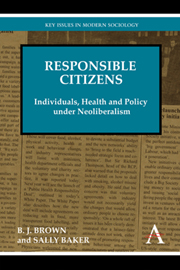Book contents
- Frontmatter
- Contents
- Acknowledgements
- Preface
- Chapter One Introduction
- Chapter Two Individualism, Neoliberalism and the Imperatives of Personal Governance
- Chapter Three Individualism in Healthcare
- Chapter Four Enlisting, Measuring and Shaping the Individual in Healthcare Policy and Practice
- Chapter Five Mental Health and Personal Responsibility
- Chapter Six Responsibility in Therapy and the Therapeutic State
- Chapter Seven The Punitive Turn in Public Services: Coercing Responsibility
- Chapter Eight Thinking about Ourselves
- Chapter Nine Talking Citizenship into Being
- References
- Index
Chapter Three - Individualism in Healthcare
Published online by Cambridge University Press: 05 December 2012
- Frontmatter
- Contents
- Acknowledgements
- Preface
- Chapter One Introduction
- Chapter Two Individualism, Neoliberalism and the Imperatives of Personal Governance
- Chapter Three Individualism in Healthcare
- Chapter Four Enlisting, Measuring and Shaping the Individual in Healthcare Policy and Practice
- Chapter Five Mental Health and Personal Responsibility
- Chapter Six Responsibility in Therapy and the Therapeutic State
- Chapter Seven The Punitive Turn in Public Services: Coercing Responsibility
- Chapter Eight Thinking about Ourselves
- Chapter Nine Talking Citizenship into Being
- References
- Index
Summary
Introduction: The Language of Biopower
In this chapter, we will explore some aspects of debates on health and health policy where they pertain to the notion of responsibility. Our discussion of the discourses of individualism and responsibility in healthcare will pay particular attention to language. The importance of this hinges on the notion that there is a dialectical relationship between society and discourse such that society (and culture) are both shaped by and simultaneously constitute discourse (Titscher, Meyer et al. 2000; Thapar-Bjorket and Morgan 2010). The centrality of language is underscored by Peters (2001, 59) when he observes:
The state has only been able to begin the process of writing itself out of its traditional responsibilities concerning the welfare state through twin strategies of a greater individualisation of society and the responsibilisation of individuals and families.
The role of language and means of communicating on policy and the broader impress of power has been particularly well explored in work on ‘biopower’. This phrase was originally used by Foucault to describe the ‘explosion of numerous and diverse techniques for achieving the subjugations of bodies and the control of populations’ (Foucault 1978, 140).
Biopower serves to
bring into view a field comprised of more or less rationalized attempts to intervene upon the vital characteristics of human existence. The vital characteristics of human beings, as living creatures who are born, mature, inhabit a body that can be trained and augmented, and then sicken and die. And the vital characteristics of collectivities or populations composed of such living beings. […]
- Type
- Chapter
- Information
- Responsible CitizensIndividuals, Health and Policy under Neoliberalism, pp. 27 - 46Publisher: Anthem PressPrint publication year: 2012

